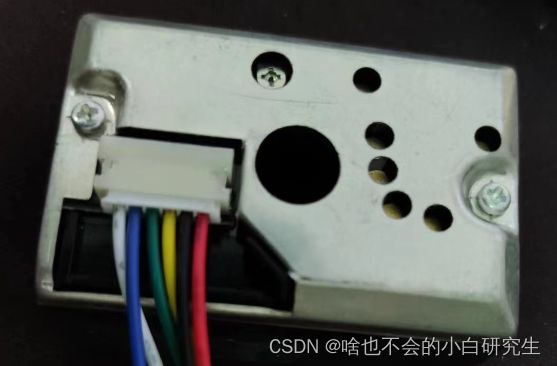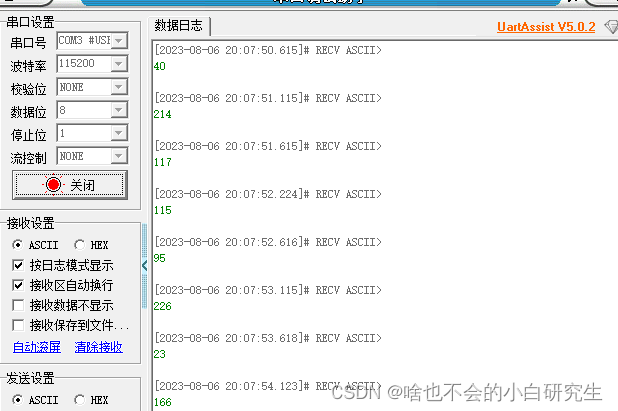- stm32-定时器
Amy.com
stm32嵌入式硬件单片机
一、定时器PLL锁相环:作用是倍频prescale:降频2440芯片定时器配置2.代码:t&=~((0xff<<12)|(0x3f<<4)|(3<<0));t|=(127<<12);t|=(2<<4);t|=(1<<0);CLKDIVN|=(2<<1)|(1<<0);二、PWM定时器控制寄存器单稳态:执行一次后关闭间隙模式:反复执行
- 多个单片机之间的SPI主从通讯
菜长江
单片机嵌入式硬件
工程文件链接:链接:https://pan.baidu.com/s/1RXp9lw2ZqyglQSwKnw7Siw?pwd=6666提取码:6666工程里面有很多例子都是看B站视频手打的(这次代码只用到了YJSPI文件夹下面的.C和.H文件其余可以忽略),只是验证通讯和配置一,概述1.因为工作是从事PCBA测试软件开发的(上位机),之前做过的很多项目都是一个单片机完成所有功能,做了有段时间了无非就
- stm32定时器实现 微秒延时
随风飘零翼
stm32stm32单片机嵌入式硬件
Cubemx配置图初始化无需使能定时器中断。代码如下:voiddelay_us(uint16_tus){uint16_tdiffer=0xffff-us-5;__HAL_TIM_SET_COUNTER(&htim17,differ);//清空定时器17HAL_TIM_Base_Start(&htim17);//启动定时器while(differ<0xffff-5){//计算differ=__HAL
- H743定时器输出PWM波方法(基于STM32CubeMX)
NW嵌入式开发
单片机开发stm32定时器PWM模式
0工具准备1.STM32CubeMX2.《STM32H743参考手册中文版》3.《stm32h743xi数据手册》1前言本文介绍基于STM32CubeMX,使用stm32h743xi,使用TIM15的通道2输出PWM波的方法。2H743定时器输出PWM波方法(基于STM32CubeMX)《STM32H743参考手册中文版》对PWM模式的描述如下:其中,有关PWM模式1和模式2的介绍见TIM15_C
- STM8L1xx利用定时器实现毫秒和微妙延时
荣070214
STM8单片机单片机毫秒和微妙延时
采用单片机的定时计数器进行毫秒和微妙级延时,精度较准。检测溢出时产生的标志位来判断延时到达。下面以STM8L101芯片为例及配合代码说明。一、实现原理:1、初始化Timer2时钟源(附上相应代码)voidTIM2Init(void){TIM2_DeInit();CLK_PeripheralClockConfig(CLK_Peripheral_TIM2,ENABLE);TIM2->CR1&=((ui
- 入门级带你实现一个安卓智能家居APP(2)kotlin版本
一粒程序米
androidkotlin智能家居WiFi单片机
前言上一篇写过java版本的实现,这一篇就写一下kotlin版本的吧。效果展示本APP是通过tcp/ip协议与连了WiFi的单片机通信。其实除了主活动类和新建项目时有一丢丢不同,其他的都是一样的哈~第一步:你得会一点点kotlin基础,建议看一本书,是郭霖大神些的《第一行代码》第三版,里面除了安卓的基础教学,还有kotlin的。第二步:建议看一本书,是郭霖大神些的《第一行代码》,先入门安卓基础。不
- 如何一键修改MDK代码风格以及error in include chain (cmsis_armcc.h): expected identfieror报错解决方法
superior tigre
单片机单片机stm32嵌入式硬件
目录一、修改MDK代码风格的两种方法1.直接设置2.替换global.prop文件,一键设置二、errorinincludechain(xxxxxxx.h):expectedidentfieror等报错的解决方法一、修改MDK代码风格的两种方法最近在学习某原子stm32的HAL库视频,被教学代码的风格深深吸引,感觉keil默认代码风格是越看越别扭,所以决定自己修改一下代码的格式,总结了两种方法,这
- 【江协STM32】11-2/3 W25Q64简介、软件SPI读写W25Q64
冰糖雪莲IO
stm32嵌入式硬件单片机
1.W25Q64简介W25Qxx系列是一种低成本、小型化、使用简单的非易失性存储器,常应用于数据存储、字库存储、固件程序存储等场景存储介质:NorFlash(闪存)时钟频率:80MHz/160MHz(DualSPI)/320MHz(QuadSPI)存储容量(24位地址):W25Q40:4Mbit/512KByteW25Q80:8Mbit/1MByteW25Q16:16Mbit/2MByteW25Q
- STM32F103C8T6点灯/流水灯(指定IO,正向反向)
BDXiaotianYA
stm32嵌入式硬件单片机
参加2023年电赛后,到现在上班一年多,长达两年时间内,几乎没有再碰过单片机,由于现在工作中需要接触到一些代码,先退回来复习下32单片机。本人在此做一件事情,傻瓜式代码,让代码足够简洁,足够规范,让你复制我的代码百分百能够使用。此账号仅作为分享本人复习过程中记录使用,如果无法使用,或者或者有优化的地方,欢迎留言,看到后第一时间给予回复。有空会将2023激光打靶代码开源出来。在使用本程序的时候,默认
- STM32八股【2】-----ARM架构
Invinciblenuonuo
stm32arm开发架构
1、架构包含哪几部分内容寄存器处理模式流水线MMU指令集中断FPU总线架构2、以STM32为例进行介绍2.1寄存器寄存器名称作用R0-R3通用寄存器用于数据传递、计算及函数参数传递;R0也用于存储函数返回值。R4-R12通用寄存器用于存储局部变量,减少频繁的内存访问。R13栈指针(SP)指向当前栈顶,负责管理栈操作。分为主栈指针(MSP)和进程栈指针(PSP):系统中断处理和普通任务可以使用不同的
- STM32八股【1】-----启动流程和startup文件理解
Invinciblenuonuo
stm32arm
启动流程知识点MCU上电复位。MSP从向量表第0个地址读取一个32位(2字节)的值并保存,该值为栈顶地址。PC计数器从第1个地址读取一个两字节的值并保存,该值为程序入口,一般是Reset_Handler。想了解FLASH地址映射可以看STM32八股【4】-----AHB地址映射__VectorsDCD__initial_sp;TopofStackDCDReset_Handler;ResetHand
- 解决stm32引脚如果选择输入模式
雁过留声花欲落
单片机嵌入式硬件
1.输入模式分类STM32的GPIO输入模式主要分为以下四种:浮空输入(FloatingInput/InputFloating)上拉输入(InputPull-Up)下拉输入(InputPull-Down)模拟输入(AnalogInput)2.各模式详解(1)浮空输入(FloatingInput)电路结构:引脚内部不连接上拉或下拉电阻,完全由外部电路决定电平状态。等效电路:引脚直接连接施密特触发器(
- STM32八股【3】------RAM和片上FLASH
Invinciblenuonuo
stm32嵌入式硬件单片机
1、RAM和FLASH构成1.RAM┌──────────────────────────┐│栈区(Stack)│←从RAM顶端向下扩展(存储局部变量、函数调用信息)│--------------------------││堆区(Heap)│←从.bss段底部向上扩展(动态分配的内存,如malloc)│--------------------------││.bss未初始化数据区│←未初始化的全局
- 嵌入式硬件篇---蓝牙模块
Ronin-Lotus
嵌入式硬件篇程序代码篇嵌入式硬件网络c蓝牙
文章目录前言一、核心技术原理蓝牙工作流程设备发现阶段配对连接阶段数据传输阶段二、协议栈架构(以BLE为例)1.物理层2.链路层3.HCI层4.GATT三、典型应用场景扩展1.室内定位系统(蓝牙5.1+)2.运动健康监测3.工业控制四、ESP32开发示例(BLE+经典蓝牙)1.环境配置2.BLE服务端代码3.经典蓝牙串口通信五、关键技术参数对比六、开发调试技巧空中抓包分析七、最新技术演进(蓝牙5.4
- [项目]基于FreeRTOS的STM32四轴飞行器: 十.检测遥控器
嵌入式T90S
stm32嵌入式硬件单片机
基于FreeRTOS的STM32四轴飞行器:十.检测遥控器一.检测遥控器连接逻辑二.遥控器的解锁情况三.遥控器控制飞机运转一.检测遥控器连接逻辑判断是否进入定高模式:根据返回值判断遥控器的连接情况:实现检测函数:因为该函数在通信任务中调度6ms一次,可以使用cnt进行计时,判断是否失联:开头初始化cnt为200可以防止一启动没有连接显示连接成功的问题。/***@description:用来检测遥控
- 单片机 - RAM 与内存、ROM 与硬盘 之间的详细对比总结
Peter_Deng.
单片机嵌入式硬件
RAM与内存RAM(RandomAccessMemory,随机存取存储器)和内存这两个术语通常是同义词,即内存常常指的就是RAM。1.RAM(内存)定义:RAM是计算机中的主存储器,用于临时存储正在运行的程序和数据。所有正在进行的操作,包括正在运行的程序、操作系统和应用程序数据,都存储在RAM中。工作原理:RAM通过直接访问任何位置的方式存取数据,故称为随机存储。数据存取速度非常快,因此在计算机中
- 【43】单片机编程核心技巧:指针基础与应用详解
智木芯语
【编程技巧】单片机嵌入式硬件#STM32#STC8嵌入式
【43】单片机编程核心技巧:指针基础与应用详解七律·指针寻址指针寻址变量间,间接操作更灵活。数组处理显优势,常量绑定守规则。绑定卸装需谨慎,地址自增效率高。C语言魂在指针,编程精髓需掌握。摘要本文系统阐述C语言指针的基础概念、操作方法及应用场景,涵盖指针与普通变量的对比、数组处理、常量指针特性等内容。通过代码示例与流程图解析,阐明指针的间接操作优势及内存寻址机制。文档遵循模块化设计规范,结合嵌入式
- 基于STM32设计的健康检测设备(测温心率计步)(局域网)
DS小龙哥
智能家居与物联网项目实战stm32嵌入式单片机
1.项目介绍1.1开发背景本项目设计一款基于STM32F103RCT6微控制器的便携式健康监测设备,该设备能够实时监测并记录用户的生理参数,包括人体温度、心率以及日常活动中的步数,并具备将这些数据可视化显示在设备自带的OLED屏幕上的能力。此外,该设备还提供了通过Wi-Fi模块ESP8266将收集到的数据无线传输至用户的智能手机或个人计算机的功能,以便用户能够更加方便地管理自己的健康信息。为了实现
- 嵌入式硬件电路设计
孤芳剑影
嵌入式嵌入式硬件单片机stm32
第一、电源确定 电源对于嵌入式系统中的作用可以看做是空气对人体的作用,甚至更重要:人呼吸的空气中有氧气、二氧化碳和氮气等但是含量稳定,这就相当于电源系统中各种杂波,我们希望得到纯净和稳定符合要求的电源,但由于各种因素制约,只是我们的梦想。这个要关注两个方面:a、电压: 嵌入式系统需要各种量级的电源比如常见的5v、3.3v、1.8v等,为尽量减小电源的纹波,在嵌入式系统中使用LDO器件。如果采用
- 基于32单片机的无人机直流电机闭环调速系统设计
赵谨言
论文毕业设计经验分享
标题:基于32单片机的无人机直流电机闭环调速系统设计内容:1.摘要本文针对无人机直流电机调速需求,设计了基于32单片机的无人机直流电机闭环调速系统。背景在于无人机应用场景不断拓展,对电机调速精度和稳定性要求日益提高。目的是开发一套高精度、响应快的闭环调速系统,以提升无人机飞行性能。方法上,采用32单片机作为控制核心,结合编码器反馈电机转速信息,运用PID控制算法实现闭环调速。通过实验测试,结果表明
- 嵌入式硬件设计 — 智能设备背后的隐形架构大师
m0_74825238
面试学习路线阿里巴巴嵌入式硬件架构
目录引言?一、嵌入式硬件设计概述(一)需求分析(二)硬件选型(三)电路设计(四)PCB制作与焊接(五)硬件调试与测试(六)软件移植与开发二、嵌入式硬件选型(一)微控制器(MCU)/微处理器(MPU)(二)存储器(三)传感器与执行器(四)电源管理芯片(五)通信接口芯片三、嵌入式硬件代码开发(一)开发环境搭建(二)底层驱动程序开发引言嵌入式系统已经渗透到我们生活的方方面面,从智能手机、智能家居到工业自
- C语言,记录一次局部变量被意外修改的问题
三日沐水
嵌入式全套学习教程c语言
背景:单片机开发过程中,我在函数体内(begin_face_record)定义了一个局部变量data_length,在使用的时候,该局部变量一直别改变,每次调用其他函数,例如c库里面的函数memcpy,不知什么情况data_length值就会被改变。1、源码分析voidmain(void){init_gpio();init_face();face_power_up();begin_face_rec
- ESP32学习 -从STM32工程架构进阶到ESP32架构
古希腊掌握嵌入式的神
学习stm32架构esp32
ESP32与STM32项目文件结构对比解析以下是对你提供的ESP32项目文件结构的详细解释,并与STM32(以STM32CubeIDE为例)的常见结构进行对比,帮助你理解两者的差异:1.ESP32项目文件解析文件/目录作用STM32对应或差异settingsIDE(如VSCode或Eclipse)的用户配置文件,存储个性化设置。STM32CubeIDE中类似配置存储在.settings目录或IDE
- stm32完全学习——NRF24L01模块
小A159
STM32完全学习stm32学习嵌入式硬件
对于这个模块的移植,无论是标准库还是HAL库,无论是软件模拟SPI还是,硬件SPI通信,网上都有很多的例子,这里关于移植的事情就不再赘述了。一、调试中遇到的一些问题我是用的别人的代码进行移植的,使用的是软件模拟SPI时序,在进行通信的时候,可以正确检测到NRF24L01的存在,但是发送数据和接收数据都不能成功的运行,本来以为是发送的时候数据包设置的不正确,后来发现他的代码里面使用软件SPI里面的延
- STM32f429串口通信-基于HAL库
大大大冯小小
串口通信stm32嵌入式
STM32f429串口通信接收-基于HAL库串口接收配置步骤1.调用函数HAL_UART_Init(UART_HandleTypeDef*huart)。通过定义结构体类型句柄UART_HandleTypeDef并初始化相关参数来配置串口通信的选用串口、字长、波特率、停止位、奇偶校验位、硬件流控、收发模式、DMA等。UART_HandleTypeDefusart1_handler;//UART句柄结
- HAL库操作STM32串口
2021.09
STM32-CubeMXstm32单片机arm
本次博客知识来自于韦东山老师的7天物联网课程。一、cubeMX产生工程框架先从左侧选择串口1,再选择异步通信。二、分析程序如下图,cubeMX自动生成了串口初始化函数。三、编写程序以上初始化完成后,就可以使用HAL库提供的“HAL_UART_Transmit()”从串口发送数据,使用“HAL_UART_Receive()”接收数据,但这样使用不方便,需要自己处理数据类型。在学习C语言时,通常使用p
- STM32寄存器编码流程总结(上部)
物联网菜鸟
基础知识学习stm32单片机嵌入式硬件
目录一、GPIO二、中断系统三、USART串口通信四、I2C通讯五、高级定时器六、DMA存储访问七、ADC数模转换八、API通信九、FSMC控制器十、LCD显示一、GPIO1.时钟的配置//开启引脚的时钟RCC->APB2ENR|=RCC_APB2ENR_IOPAEN;2.设置GPIO的工作模式//PA0的工作模式为通用推挽输出模式//CNF选择输入或输出的不同模式GPIOA->CRL&=~GPI
- 嵌入式笔记 | 正点原子STM32F103ZET6 3 | 时钟系统
J鸟
笔记stm32单片机嵌入式硬件
1.RCC(复位和时钟控制)RCC(ResetandClockControl)是STM32的时钟系统控制模块,负责管理整个芯片的时钟信号。在使用任何外设之前,必须先使能其时钟。2.时钟系统框图解析时钟源(5种)HSI(高速内部时钟)由内部RC振荡器产生,默认8MHz精度较低,适用于对时钟精度要求不高的应用可作为系统时钟源HSE(高速外部时钟)由外部晶振(石英/陶瓷谐振器或外部时钟)产生,频率范围4
- -5V、-3V...这种负电压是怎么产生的?附电路详解!
捷配科技
PCB大全制造pcb工艺捷配
在电子电路领域,负电压常常是不可或缺的元素,尤其在运算放大器等应用场景中,为其建立稳定的负电压供电至关重要。以常见的正5V转负5V为例,来探讨负电压产生的电路原理。通常情况下,若要获取负电压,专用的负压产生芯片是首选,如ICL7600、LT1054等,但这些芯片成本相对较高。在单片机电子电路中,有几种常用的负压产生电路,且这些电路往往能巧妙利用单片机的PWM输出功能。很多单片机的PWM输出功能未被
- STM32上实现简化版的AUTOSAR DEM模块
智驾
STM32stm32AUTOSARDEMDTCFlashDBNvm
文章目录摘要摘要在一些可以不使用AUTOSAR的项目中,往往也有故障检测和DTC存储的需求,开发一套类似于AUTOSARDEM模块的软件代码,能够满足DTC的检出和存储,使用FalshDB代替Nvm模块,轻松构建持久化存储,如果你也有这样的需求,请阅读本篇,希望能够帮到你。/**************************************************************
- java数字签名三种方式
知了ing
javajdk
以下3钟数字签名都是基于jdk7的
1,RSA
String password="test";
// 1.初始化密钥
KeyPairGenerator keyPairGenerator = KeyPairGenerator.getInstance("RSA");
keyPairGenerator.initialize(51
- Hibernate学习笔记
caoyong
Hibernate
1>、Hibernate是数据访问层框架,是一个ORM(Object Relation Mapping)框架,作者为:Gavin King
2>、搭建Hibernate的开发环境
a>、添加jar包:
aa>、hibernatte开发包中/lib/required/所
- 设计模式之装饰器模式Decorator(结构型)
漂泊一剑客
Decorator
1. 概述
若你从事过面向对象开发,实现给一个类或对象增加行为,使用继承机制,这是所有面向对象语言的一个基本特性。如果已经存在的一个类缺少某些方法,或者须要给方法添加更多的功能(魅力),你也许会仅仅继承这个类来产生一个新类—这建立在额外的代码上。
- 读取磁盘文件txt,并输入String
一炮送你回车库
String
public static void main(String[] args) throws IOException {
String fileContent = readFileContent("d:/aaa.txt");
System.out.println(fileContent);
- js三级联动下拉框
3213213333332132
三级联动
//三级联动
省/直辖市<select id="province"></select>
市/省直辖<select id="city"></select>
县/区 <select id="area"></select>
- erlang之parse_transform编译选项的应用
616050468
parse_transform游戏服务器属性同步abstract_code
最近使用erlang重构了游戏服务器的所有代码,之前看过C++/lua写的服务器引擎代码,引擎实现了玩家属性自动同步给前端和增量更新玩家数据到数据库的功能,这也是现在很多游戏服务器的优化方向,在引擎层面去解决数据同步和数据持久化,数据发生变化了业务层不需要关心怎么去同步给前端。由于游戏过程中玩家每个业务中玩家数据更改的量其实是很少
- JAVA JSON的解析
darkranger
java
// {
// “Total”:“条数”,
// Code: 1,
//
// “PaymentItems”:[
// {
// “PaymentItemID”:”支款单ID”,
// “PaymentCode”:”支款单编号”,
// “PaymentTime”:”支款日期”,
// ”ContractNo”:”合同号”,
//
- POJ-1273-Drainage Ditches
aijuans
ACM_POJ
POJ-1273-Drainage Ditches
http://poj.org/problem?id=1273
基本的最大流,按LRJ的白书写的
#include<iostream>
#include<cstring>
#include<queue>
using namespace std;
#define INF 0x7fffffff
int ma
- 工作流Activiti5表的命名及含义
atongyeye
工作流Activiti
activiti5 - http://activiti.org/designer/update在线插件安装
activiti5一共23张表
Activiti的表都以ACT_开头。 第二部分是表示表的用途的两个字母标识。 用途也和服务的API对应。
ACT_RE_*: 'RE'表示repository。 这个前缀的表包含了流程定义和流程静态资源 (图片,规则,等等)。
A
- android的广播机制和广播的简单使用
百合不是茶
android广播机制广播的注册
Android广播机制简介 在Android中,有一些操作完成以后,会发送广播,比如说发出一条短信,或打出一个电话,如果某个程序接收了这个广播,就会做相应的处理。这个广播跟我们传统意义中的电台广播有些相似之处。之所以叫做广播,就是因为它只负责“说”而不管你“听不听”,也就是不管你接收方如何处理。另外,广播可以被不只一个应用程序所接收,当然也可能不被任何应
- Spring事务传播行为详解
bijian1013
javaspring事务传播行为
在service类前加上@Transactional,声明这个service所有方法需要事务管理。每一个业务方法开始时都会打开一个事务。
Spring默认情况下会对运行期例外(RunTimeException)进行事务回滚。这
- eidtplus operate
征客丶
eidtplus
开启列模式: Alt+C 鼠标选择 OR Alt+鼠标左键拖动
列模式替换或复制内容(多行):
右键-->格式-->填充所选内容-->选择相应操作
OR
Ctrl+Shift+V(复制多行数据,必须行数一致)
-------------------------------------------------------
- 【Kafka一】Kafka入门
bit1129
kafka
这篇文章来自Spark集成Kafka(http://bit1129.iteye.com/blog/2174765),这里把它单独取出来,作为Kafka的入门吧
下载Kafka
http://mirror.bit.edu.cn/apache/kafka/0.8.1.1/kafka_2.10-0.8.1.1.tgz
2.10表示Scala的版本,而0.8.1.1表示Kafka
- Spring 事务实现机制
BlueSkator
spring代理事务
Spring是以代理的方式实现对事务的管理。我们在Action中所使用的Service对象,其实是代理对象的实例,并不是我们所写的Service对象实例。既然是两个不同的对象,那为什么我们在Action中可以象使用Service对象一样的使用代理对象呢?为了说明问题,假设有个Service类叫AService,它的Spring事务代理类为AProxyService,AService实现了一个接口
- bootstrap源码学习与示例:bootstrap-dropdown(转帖)
BreakingBad
bootstrapdropdown
bootstrap-dropdown组件是个烂东西,我读后的整体感觉。
一个下拉开菜单的设计:
<ul class="nav pull-right">
<li id="fat-menu" class="dropdown">
- 读《研磨设计模式》-代码笔记-中介者模式-Mediator
bylijinnan
java设计模式
声明: 本文只为方便我个人查阅和理解,详细的分析以及源代码请移步 原作者的博客http://chjavach.iteye.com/
/*
* 中介者模式(Mediator):用一个中介对象来封装一系列的对象交互。
* 中介者使各对象不需要显式地相互引用,从而使其耦合松散,而且可以独立地改变它们之间的交互。
*
* 在我看来,Mediator模式是把多个对象(
- 常用代码记录
chenjunt3
UIExcelJ#
1、单据设置某行或某字段不能修改
//i是行号,"cash"是字段名称
getBillCardPanelWrapper().getBillCardPanel().getBillModel().setCellEditable(i, "cash", false);
//取得单据表体所有项用以上语句做循环就能设置整行了
getBillC
- 搜索引擎与工作流引擎
comsci
算法工作搜索引擎网络应用
最近在公司做和搜索有关的工作,(只是简单的应用开源工具集成到自己的产品中)工作流系统的进一步设计暂时放在一边了,偶然看到谷歌的研究员吴军写的数学之美系列中的搜索引擎与图论这篇文章中的介绍,我发现这样一个关系(仅仅是猜想)
-----搜索引擎和流程引擎的基础--都是图论,至少像在我在JWFD中引擎算法中用到的是自定义的广度优先
- oracle Health Monitor
daizj
oracleHealth Monitor
About Health Monitor
Beginning with Release 11g, Oracle Database includes a framework called Health Monitor for running diagnostic checks on the database.
About Health Monitor Checks
Health M
- JSON字符串转换为对象
dieslrae
javajson
作为前言,首先是要吐槽一下公司的脑残编译部署方式,web和core分开部署本来没什么问题,但是这丫居然不把json的包作为基础包而作为web的包,导致了core端不能使用,而且我们的core是可以当web来用的(不要在意这些细节),所以在core中处理json串就是个问题.没办法,跟编译那帮人也扯不清楚,只有自己写json的解析了.
- C语言学习八结构体,综合应用,学生管理系统
dcj3sjt126com
C语言
实现功能的代码:
# include <stdio.h>
# include <malloc.h>
struct Student
{
int age;
float score;
char name[100];
};
int main(void)
{
int len;
struct Student * pArr;
int i,
- vagrant学习笔记
dcj3sjt126com
vagrant
想了解多主机是如何定义和使用的, 所以又学习了一遍vagrant
1. vagrant virtualbox 下载安装
https://www.vagrantup.com/downloads.html
https://www.virtualbox.org/wiki/Downloads
查看安装在命令行输入vagrant
2.
- 14.性能优化-优化-软件配置优化
frank1234
软件配置性能优化
1.Tomcat线程池
修改tomcat的server.xml文件:
<Connector port="8080" protocol="HTTP/1.1" connectionTimeout="20000" redirectPort="8443" maxThreads="1200" m
- 一个不错的shell 脚本教程 入门级
HarborChung
linuxshell
一个不错的shell 脚本教程 入门级
建立一个脚本 Linux中有好多中不同的shell,但是通常我们使用bash (bourne again shell) 进行shell编程,因为bash是免费的并且很容易使用。所以在本文中笔者所提供的脚本都是使用bash(但是在大多数情况下,这些脚本同样可以在 bash的大姐,bourne shell中运行)。 如同其他语言一样
- Spring4新特性——核心容器的其他改进
jinnianshilongnian
spring动态代理spring4依赖注入
Spring4新特性——泛型限定式依赖注入
Spring4新特性——核心容器的其他改进
Spring4新特性——Web开发的增强
Spring4新特性——集成Bean Validation 1.1(JSR-349)到SpringMVC
Spring4新特性——Groovy Bean定义DSL
Spring4新特性——更好的Java泛型操作API
Spring4新
- Linux设置tomcat开机启动
liuxingguome
tomcatlinux开机自启动
执行命令sudo gedit /etc/init.d/tomcat6
然后把以下英文部分复制过去。(注意第一句#!/bin/sh如果不写,就不是一个shell文件。然后将对应的jdk和tomcat换成你自己的目录就行了。
#!/bin/bash
#
# /etc/rc.d/init.d/tomcat
# init script for tomcat precesses
- 第13章 Ajax进阶(下)
onestopweb
Ajax
index.html
<!DOCTYPE html PUBLIC "-//W3C//DTD XHTML 1.0 Transitional//EN" "http://www.w3.org/TR/xhtml1/DTD/xhtml1-transitional.dtd">
<html xmlns="http://www.w3.org/
- Troubleshooting Crystal Reports off BW
blueoxygen
BO
http://wiki.sdn.sap.com/wiki/display/BOBJ/Troubleshooting+Crystal+Reports+off+BW#TroubleshootingCrystalReportsoffBW-TracingBOE
Quite useful, especially this part:
SAP BW connectivity
For t
- Java开发熟手该当心的11个错误
tomcat_oracle
javajvm多线程单元测试
#1、不在属性文件或XML文件中外化配置属性。比如,没有把批处理使用的线程数设置成可在属性文件中配置。你的批处理程序无论在DEV环境中,还是UAT(用户验收
测试)环境中,都可以顺畅无阻地运行,但是一旦部署在PROD 上,把它作为多线程程序处理更大的数据集时,就会抛出IOException,原因可能是JDBC驱动版本不同,也可能是#2中讨论的问题。如果线程数目 可以在属性文件中配置,那么使它成为
- 正则表达式大全
yang852220741
html编程正则表达式
今天向大家分享正则表达式大全,它可以大提高你的工作效率
正则表达式也可以被当作是一门语言,当你学习一门新的编程语言的时候,他们是一个小的子语言。初看时觉得它没有任何的意义,但是很多时候,你不得不阅读一些教程,或文章来理解这些简单的描述模式。
一、校验数字的表达式
数字:^[0-9]*$
n位的数字:^\d{n}$
至少n位的数字:^\d{n,}$
m-n位的数字:^\d{m,n}$
![]()
![]()
![]()
![]()
![]()
![]()

